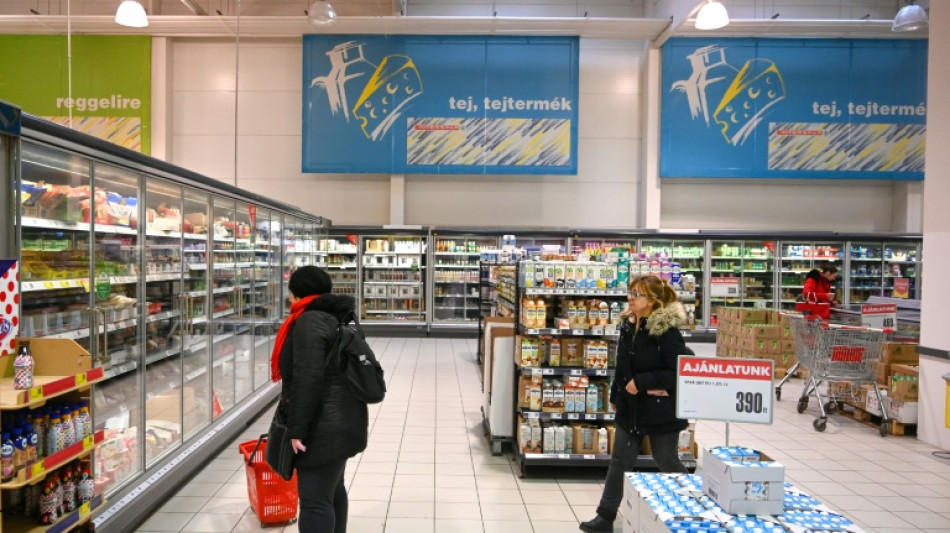
-
 Hezbollah official targeted in deadly Israeli strike on Beirut
Hezbollah official targeted in deadly Israeli strike on Beirut
-
Israel PM drops security chief nominee under fire from Trump ally
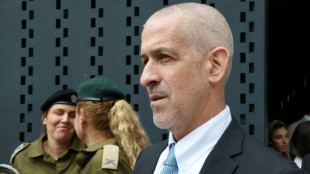
-
 Stock markets edge up but Trump tariff fears dampen mood
Stock markets edge up but Trump tariff fears dampen mood
-
South Korea court to rule Friday on president impeachment
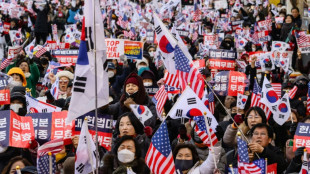
-
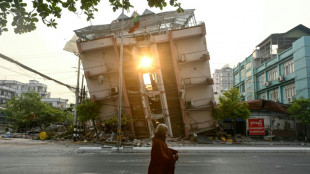 'Can collapse anytime': Mandalay quake victims seek respite outdoors
'Can collapse anytime': Mandalay quake victims seek respite outdoors
-
Stock markets edge back but Trump tariff fears dampen mood

-
 Myanmar holds minute of silence for more than 2,000 quake dead
Myanmar holds minute of silence for more than 2,000 quake dead
-
Kenya president still handing cash to churches despite his own ban

-
 Israeli strike on Beirut kills three
Israeli strike on Beirut kills three
-
Russia-born Kasatkina says 'didn't have much choice' after Australia switch

-
 Carmakers face doubts and jolts over US tariffs
Carmakers face doubts and jolts over US tariffs
-
China holds large-scale military drills around Taiwan

-
 'Heartbreaking' floods swamp Australia's cattle country
'Heartbreaking' floods swamp Australia's cattle country
-
South Korean baseball put on hold after fan killed at stadium
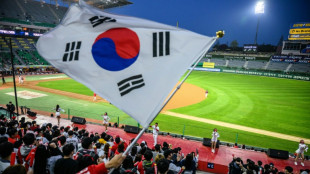
-
 Celtics, Thunder power toward NBA playoffs, Lakers shoot down Rockets
Celtics, Thunder power toward NBA playoffs, Lakers shoot down Rockets
-
French prosecutors demand Volkswagen face fresh Dieselgate trial

-
 Sam Mendes to launch four 'Beatles' movies in same month
Sam Mendes to launch four 'Beatles' movies in same month
-
Battery boom drives Bangladesh lead poisoning epidemic

-
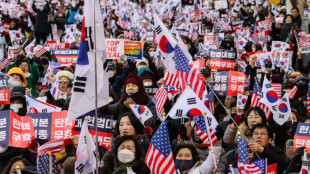 South Korea president impeachment ruling Friday: court
South Korea president impeachment ruling Friday: court
-
Israel strikes Hezbollah operative in Beirut, kills 3

-
 Desperate Rohingya mark Eid in Indonesia limbo
Desperate Rohingya mark Eid in Indonesia limbo
-
Sam Kerr has 'full support' of Australia squad, vice-captain says

-
 Asian markets edge back but Trump tariff fears dampen mood
Asian markets edge back but Trump tariff fears dampen mood
-
Teenage opener Konstas gets Australia contract with Ashes on horizon

-
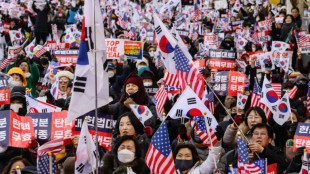 S. Korea court to rule Friday on President Yoon impeachment
S. Korea court to rule Friday on President Yoon impeachment
-
Myanmar to hold minute of silence for more than 2,000 quake dead

-
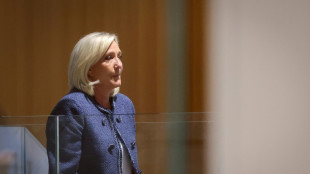 Far-right leaders rally around France's Le Pen after poll ban
Far-right leaders rally around France's Le Pen after poll ban
-
SpaceX launches private astronauts on first crewed polar orbit

-
 China launches military drills around Taiwan
China launches military drills around Taiwan
-
Political support leading to increasing fallout for crypto

-
 France's Le Pen seeks to keep presidency hopes alive after election ban
France's Le Pen seeks to keep presidency hopes alive after election ban
-
Trump tariffs threaten Latin American steel industry
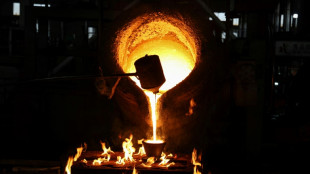
-
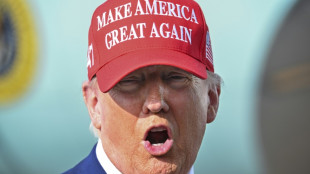 'Tariff man': Trump's long history with trade wars
'Tariff man': Trump's long history with trade wars
-
Tariffs: Economic 'liberation' or straitjacket?
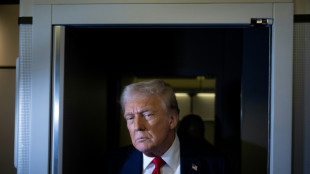
-
 Undocumented migrants turn to Whatsapp to stay ahead of US raids
Undocumented migrants turn to Whatsapp to stay ahead of US raids
-
What next for Venezuela as Trump goes after oil revenues?

-
 New Zealand Rugby and Ineos settle sponsorship dispute
New Zealand Rugby and Ineos settle sponsorship dispute
-
China says launches military exercises around Taiwan

-
 Team New Zealand fails in bid to host 2027 America's Cup
Team New Zealand fails in bid to host 2027 America's Cup
-
iSON Xperiences Appoints Ricardo Langwieder as Global Chief Sales Officer to Drive Growth and Innovation

-
 Zeus North America Mining Corp. Defines High-Priority Drill Targets at Cuddy Mountain
Zeus North America Mining Corp. Defines High-Priority Drill Targets at Cuddy Mountain
-
Fluent Bit v4 Released: Transforming Telemetry Data Management

-
 Helium One Global Ltd Announces Jackson-4 Flow Testing and Gas Sampling Analysis
Helium One Global Ltd Announces Jackson-4 Flow Testing and Gas Sampling Analysis
-
Trump says will be 'kind' with tariffs as deadline looms
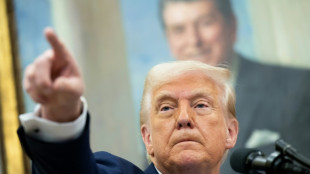
-
 OpenAI says it raised $40 bn at valuation of $300 bn
OpenAI says it raised $40 bn at valuation of $300 bn
-
Safely back on Earth, once-stranded US astronauts ready to fly again

-
 Syria president says new authorities can't satisfy everyone
Syria president says new authorities can't satisfy everyone
-
US robbers who touted crime on Instagram jailed

-
 Fernandes 'not going anywhere', says Man Utd boss Amorim
Fernandes 'not going anywhere', says Man Utd boss Amorim
-
US regulators tell 23andMe to protect genetic data
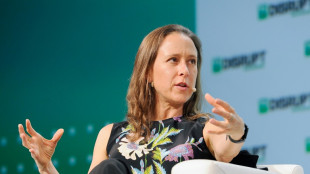

Orban's food price cap takes aim at foreign retailers in Hungary
Seeking to tame public anger over soaring inflation, Hungarian Prime Minister Viktor Orban has imposed price controls on basic food items sold in supermarkets, renewing his fight against multinational companies.
Economists say the measure may bring short-term relief to consumers, but it provides little help to many in rural areas who live far from bigger towns where large retailers are located.
"Small stores are not affected, only big multinationals, and we don't go there," said retiree Erzsebet Risztics, 68, who lives in Tiszaroff, a village in one of the Central European country's poorest regions.
Risztics, who has diabetes, can also no longer afford low-sugar food items she needs "because they've gotten terribly expensive", and sparse bus services keep her from shopping in surrounding towns.
Another retiree, 80-year-old Erzsebet Forgo, said: "It hurts that the village is left out" of the price controls.
Inflation has roared back in Hungary, reaching 5.7 percent in February, the highest level in the 27-nation European Union. By comparison, consumer prices rose by 2.7 percent on average across the EU.
In mid-March, Orban, who faces elections next year, introduced a measure capping supermarket markups on 30 basic food items at 10 percent above wholesale costs.
The measure -- which includes foods like eggs, milk, and meats -- exempts retailers with smaller annual revenues, de facto sparing local grocers.
- 'Plundering' Hungarians -
Shortly after the measures went into effect, Orban accused foreign retailers of "plundering Hungarians" with their "excessive and unjustified price rises".
Alleging margins of 42 percent on chicken wings or 70 percent on yogurts, Orban said the "emergency intervention" was designed to rein in retailers which "only care about profit".
Since his return to power in 2010, the nationalist leader has repeatedly railed against large international retail chains that began flourishing after the fall of Communism, sidelining less-competitive Hungarian grocers.
In recent years, the Hungarian state has rolled out measures penalising multinational companies, while pouring taxpayers' money into economic sectors like banking and telecoms. Some of those sizeable domestic firms were subsequently sold to people close to Orban.
But with big European chains like SPAR, Lidl and Tesco dominating Hungary's retail sector, the government resorted to introducing protectionist measures, including a tax on superprofits as well as temporary price caps.
Last year, Austrian supermarket chain SPAR accused the Hungarian government of discriminating against foreign companies, with an EU top court ruling in its favour in a separate case.
- Opposite effect -
The Hungarian Trade Association, which represents many of the country's top retailers, rejected the government's accusations of profiteering.
The group says profits have been dwindling or turned into losses, with multinationals having to pay a sales tax, unlike their smaller Hungarian rivals.
At SPAR, the price controls are expected to result in an additional monthly burden of about 3.7 million euros (nearly $4 million), according to financial news site Portfolio, citing an internal e-mail.
Gabriella Heiszler, the head of SPAR's Hungarian subsidiary, warned of drastic measures such as potential layoffs "if the current regulatory environment does not improve".
Economists warn that retailers might raise prices on other food items to make up for lost revenues, ultimately producing the opposite effect.
"Initially, it could curb inflation, because it is a wide range of products," David Nemeth, lead analyst at K&H Bank told AFP.
Orban had imposed similar price caps in 2022 and 2023, when inflation had soared to as high as 26 percent in the wake of Russia's invasion of Ukraine.
Nemeth said the latest measures would -- just like the previous one -- "boost inflation" in the long-term, with prices likely to be increased once the caps are phased out, he added.
According to Eurostat, Hungary, alongside Bulgaria, ranked last in household consumption within the EU in 2023.
Rozalia Patak, an unemployed mother of five, hopes the price controls will make life a bit easier.
In her hunt for good deals, she sometimes takes a bus to a nearby city to get hold of the "cheapest pasta" there.
"Everything is so expensive. We can't afford salami or fish," said the 51-year-old, who now collects plastic bottles to make a bit of cash on the side.
X.Karnes--AMWN